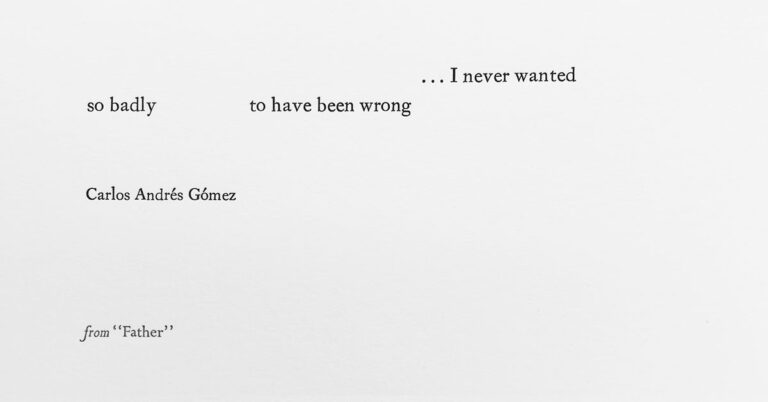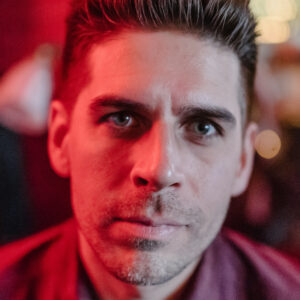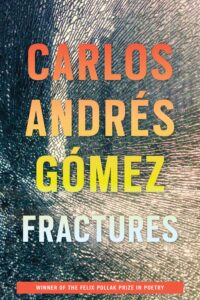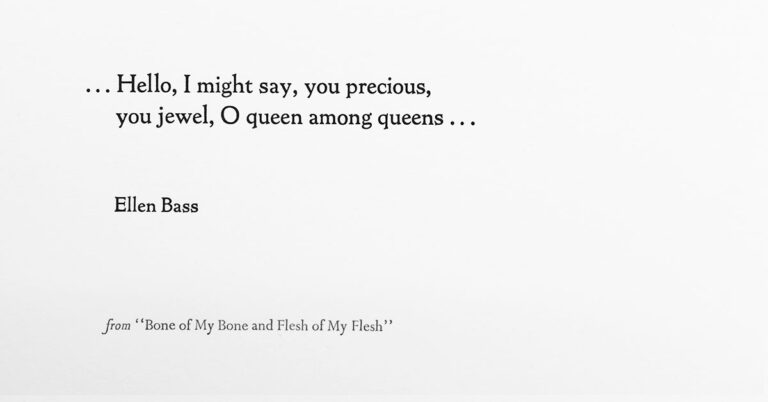Carlos Andrés Gómez
Father
How has becoming a parent — or being a caregiver — changed you?
This is a poem of two halves. In the first half, a man questions God — how could a loving Father allow suffering to happen? And in the second half, the man becomes a father himself, filled with fear and love. His questions about fatherhood change; he’s no longer wondering about the beyond, he’s wondering about the right now.

Image by Expedition Press/Expedition Press, © All Rights Reserved.
Guest

Carlos Andrés Gómez is a Colombian American poet from New York City. “Father” appears in his debut full-length poetry collection Fractures, which was selected by Natasha Trethewey as the winner of the 2020 Felix Pollak Prize in Poetry. Gómez has won the Sandy Crimmins National Prize for Poetry and the Atlanta Review International Poetry Prize. His work has been published in New England Review, Beloit Poetry Journal, The Yale Review, and elsewhere.
Transcript
Pádraig Ó Tuama, host: My name is Pádraig Ó Tuama, and one of the things I love about poetry and notice about poetry is that some people write the same poem over and over again in different books, as they keep on returning to a moment of love, as they try to capture the expression of joy, and the moment that something happened that opened them up to the world in a way that their life has never been the same since.
[music: “What Did You Not Hear” by Gautam Srikishan]
Ó Tuama: “Father” by Carlos Andrés Gómez:
“I.
In the basement of the crack house I used to visit
as an outreach worker on 121st street in Harlem,
I was convinced He refused
to travel north of 96th. I wrote a letter
to Joanna on her mission in Taiwan, detailed
each irrefutable piece of evidence proving
we are all, in fact, alone.
Told her about the nine-year-old orphan
forced to sell her body
for three years before ending up just off
Times Square, discarded in a dumpster.
I told her about the eldest son
who answered a burglar’s call and was shot,
paralyzed from the waist down. I asked her
about drought and famine and endless
civil wars—what lessons does His book
refuse?
“II.
When her heart rate dropped by half in less
than a minute, the population of our cramped
hospital room tripling in a handful of seconds,
I grasped for anything that would keep me
upright. At first, the wall: cool and steady,
demanding my body ascend beyond what seemed
possible. Then, nothing,
no one. I stood in the waiting room
of the O.R. waiting to be called in,
to find out if my child had survived.
I spent each second trying to pull tiny shoe-coverings
over my too-large feet. I confessed every wrong
of my life to an empty, over-lit room of steel
and sterile instruments that all reflected back
distorted versions of myself. I fumbled
for any prayer I could remember, hoping
that I had all along been mistaken about the hollow
blackness of the infinite sky. I never wanted
so badly to have been wrong
about anything in my life—
and then a disembodied
voice called out, seemingly only to me—
a tiny growl at first that blossomed
into a wail dwarfing any thought my mind
could possibly hold, any faith
I’d ever been so foolish to claim.”
[music: “What Did You Not Hear” by Gautam Srikishan]
Ó Tuama: This book is called Hijito, meaning Son, and this poem is called “Father.” And so the book hinges on many of these questions about performances of masculinity, performances of power, performances of love, and what does it mean to be in relationship with each other.
Formally, the poem is in two parts, but it seems to me like the poem is in three parts, and it’s troubling the question of God, in light of becoming a father. And the poem is called “Father,” which seems like a challenge to the idea of God as father, as well as an opening up to Carlos Andrés Gómez becoming a father himself in that moment. And it doesn’t revert in the final part into saying, “Oh, no, now I understand God as father.” It continues to change, and that’s what I loved the poem is that it felt theological and embodied, all at once. And I think that’s the best kind of theology, but, often, theology can feel very disembodied, and human experience can feel embodied. And I think he brought the question about thinking about real meaning and about thinking about how any holy book can speak to the reality of everyday life, right into the guts of being human, locating us in 121st Street or locating us in Times Square or locating us in any part of any city, where the question of God comes face-to-face with the question of pain and the way that humans hurt humans.
[music: “What Did You Not Hear” by Gautam Srikishan]
Ó Tuama: Carlos Andrés Gómez here is holding a variety of windows into the question of God. And the first one is really true — and it doesn’t diminish, just because he becomes a father at the end; there are serious accusations here. We hear about kids who are exploited or injured, and wondering if there’s any such thing as a loving God. And then there’s mentions of drought and famine and war, and he’s writing to his friend Joanna, who’s on a mission in Taiwan while he’s an outreach worker in Manhattan. And I think it’s a fantastic challenge. And then it just changes totally, and we’re in this OR in this waiting room, and it seems like his partner, who was birthing a child, her heart rate has dropped. And then the population in the room triples, with medics coming in, and he’s outside, suddenly, feeling totally helpless. And he’s wishing that there was some kind of God he could turn to. And then the third part, and even though, formally, this is still part of the second half, it seems to me like it turns again, just towards the end, where there’s “a tiny growl” and “a disembodied voice.” And this tiny growl and the disembodied voice seems to change everything, to him. It’s almost like this tiny person becomes the god to him, the one that he’s going to seek after and the one that he’s going to do everything to love and to respond to and to be faithful to.
And that changes the idea about what does it mean to believe in something? Do they have to be all-powerful, in order for you to believe in it? And I think that’s a very clever way of asking the big questions of life, as well as, clearly, a beautiful story about him becoming a parent.
[music: “First Grief, First Air” by Gautam Srikishan]
Ó Tuama: So the last line is really worthwhile hearing again and reflecting on it:
“and then a disembodied
voice called out, seemingly only to me—
a tiny growl at first that blossomed
into a wail dwarfing any thought my mind
could possibly hold, any faith
I’d ever been so foolish to claim.”
The way I read this is that I don’t place too much emphasis on faith. I do place emphasis on claim, because “claim” is a word of power, to claim to own, to claim to dismiss, to claim to have knowledge over. It feels to me like the poet here is realizing, I’ve just become a father, and is facing into this future filled with love and dedication, but also filled with inadequacy. And he isn’t going to be able to claim anything. He’s going to be learning so much. And he’ll need a lot of help, like anybody does. And I think there is a different posture towards the question of power and control here, and faith seems to be about practice, towards the end. And what he seems to be suddenly more interested in is possibly less the question as to whether there’s a God or not and more the question about what it will mean for him to be a father, rather than arguing how adequate or inadequate any God might be as a parent figure.
[music: “First Grief, First Air” by Gautam Srikishan]
Ó Tuama: The first part of this poem is really clever, because you hear about him working as an outreach worker on 121st Street in Harlem, and you hear that he “was convinced He refused to travel north of 96th.” And if you’re hearing that, you’re like — if you’re hearing that, you’re wondering, Who’s “He”? When you’re reading it, you see that “He” has a capital H, and so you think, is this speaking about God? And then he writes to his friend, who’s on mission, and then there’s all these accusations about, basically, building up to the idea of how could a loving God stand over, when a city is experiencing these kinds of hardships and policy failures? And then it returns to saying, “what lessons does His book refuse?” And so, clearly, then, you are asking the question of theodicy, the question from the Book of Job: How can God be present when this kind of reality is happening? And what lessons does his book refuse? It seems to be that he’s suggesting that the holy book — the Bible, I suppose — is refusing to learn lessons from the way that life is being experienced in the daily reality.
And I love that. There’s a challenge to the idea about religion that thinks it knows everything. And really, he’s saying, What lessons are you refusing to learn? He’s thinking that religion has lessons to learn, rather than other people.
[music: “At Dusk” by Gautam Srikishan]
Ó Tuama: My friend Andrew was an Australian, living in Ireland. And Andrew was a total lapsed Baptist. He was dissatisfied with religion. But he seemed to feel so guilty about leaving religion behind. And he told me, once, a story of him driving along in Belfast, and in the backseat was his daughter, Eden, who I think was about three-and-a-half or four. And it was Christmas, and she was very excited. But she was also confused, because he’d been telling her about Jesus and Christmas and Jesus’s birthday. But she’d just had a new cousin born in Australia, called Jesse. And his daughter was totally confused between Jesse and Jesus, and she thought everybody around the world was celebrating Christmas in honor of Jesse, her new cousin born in Queensland, in Australia.
And so he said to her, while he’s driving along — he told me he was looking at her in the rearview mirror — “No, no, no, Jesse is your cousin and lives in Australia.” And then she said, “And who’s Jesus, and where does he live?” And Andrew was feeling really awkward, because he had kind of moved away from his Baptist faith, but he didn’t want to announce that. And he said to her, “Well, Jesus is God’s son, and he lives in your heart.” And he told me that she looked at him in the mirror with absolute incredulity, and she said, “No, he doesn’t.”
And he told me that up until that stage, he’d never felt so proud of her in his whole life, because everything changed for him, because he saw in her the possibility of saying what she wanted about religion and still being loved. And she had a freedom, at three-and-a-half, that he didn’t feel like he had. I suppose he was in his mid-30s at that stage. And she changed him. Not to say that she moved him one way or another about religion; I’m sure he thinks whatever he wants to about religion. But it was the freedom with which she spoke about religion that changed him. And he realized that he loved her so much that if he had any imagination about a parent-God, that he would be able to think what he wants and have an imagination of freedom within that.
And I found that so lovely, not because it moved him deeper into belief or further from belief, but because it located him in a story of love, of him as a father towards his daughter.
I feel like the story of Andrew and Eden is almost like a companion story to this brilliant poem by Carlos Andrés Gómez, because he is preparing the ground, just at the moment of birth, when this wail has come out, seemingly only for him, a growl into a wail. And he seems to be open to the fact that everything is going to be different now, that the center of gravity and the center of imagination is geared towards this tiny person. And I think that the openness that Carlos Andrés Gómez has in this poem is the kind of openness that we hope we will all have in any loving relationship, with children, with friends, partners, with people that we associate with; that love can open us up to the possibility of learning new things.
[music: “Into the Earth” by Gautam Srikishan]
Ó Tuama: “Father” by Carlos Andrés Gómez:
“I.
In the basement of the crack house I used to visit
as an outreach worker on 121st street in Harlem,
I was convinced He refused
to travel north of 96th. I wrote a letter
to Joanna on her mission in Taiwan, detailed
each irrefutable piece of evidence proving
we are all, in fact, alone.
Told her about the nine-year-old orphan
forced to sell her body
for three years before ending up just off
Times Square, discarded in a dumpster.
I told her about the eldest son
who answered a burglar’s call and was shot,
paralyzed from the waist down. I asked her
about drought and famine and endless
civil wars—what lessons does His book
refuse?
“II.
When her heart rate dropped by half in less
than a minute, the population of our cramped
hospital room tripling in a handful of seconds,
I grasped for anything that would keep me
upright. At first, the wall: cool and steady,
demanding my body ascend beyond what seemed
possible. Then, nothing,
no one. I stood in the waiting room
to the O.R. waiting to be called in,
to find out if my child had survived.
I spent each second trying to pull tiny shoe-coverings
over my too-large feet. I confessed every wrong
of my life to an empty, over-lit room of steel
and sterile instruments that all reflected back
distorted versions of myself. I fumbled
for any prayer I could remember, hoping
that I had all along been mistaken about the hollow
blackness of the infinite sky. I never wanted
so badly to have been wrong
about anything in my life—
and then a disembodied
voice called out, seemingly only to me—
a tiny growl at first that blossomed
into a wail dwarfing any thought my mind
could possibly hold, any faith
I’d ever been so foolish to claim.”
[music: “Praise the Rain” by Gautam Srikishan]
Lily Percy: “Father” comes from Carlos Andrés Gómez’ book, Hijito. Thank you to Platypus Press who gave us permission to use Carlos’ poem. You can find a link to the poem in our show notes, along with Pádraig’s guiding question for this episode.
Poetry Unbound is Chris Heagle, Erin Colasacco, Serri Graslie, Eddie Gonzalez, Lilian Vo, Christiane Wartell, Karen Navarre, Karyn Towey, Sue Ariza, and me, Lily Percy. Our music is composed and provided by Gautam Srikishan and Blue Dot Sessions. This podcast is produced by On Being Studios, which is located on Dakota land. We also produce other podcasts you might enjoy, like On Being with Krista Tippett, Becoming Wise, and This Movie Changed Me — find those wherever you like to listen or visit us at onbeing.org to find out more.
Books & Music
Recommended Reading
The On Being Project is an affiliate partner of Bookshop.org and Amazon.com. Any earnings we receive through these affiliate partnerships go into directly supporting The On Being Project.











Reflections